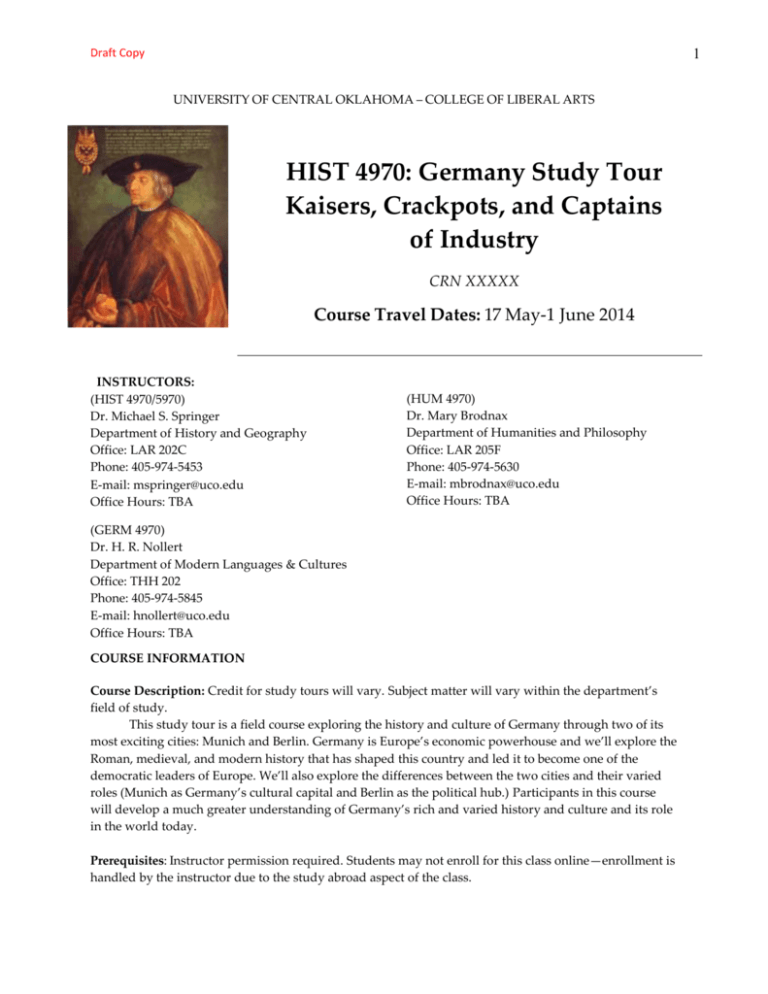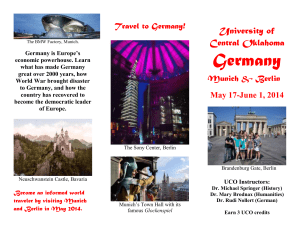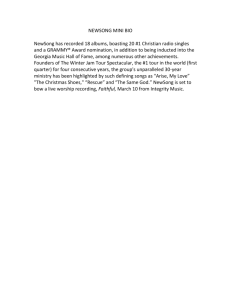Tour Syllabus (undergrad) - University of Central Oklahoma
advertisement

Draft Copy 1 UNIVERSITY OF CENTRAL OKLAHOMA – COLLEGE OF LIBERAL ARTS HIST 4970: Germany Study Tour Kaisers, Crackpots, and Captains of Industry CRN XXXXX Course Travel Dates: 17 May-1 June 2014 INSTRUCTORS: (HIST 4970/5970) Dr. Michael S. Springer Department of History and Geography Office: LAR 202C Phone: 405-974-5453 E-mail: mspringer@uco.edu Office Hours: TBA (HUM 4970) Dr. Mary Brodnax Department of Humanities and Philosophy Office: LAR 205F Phone: 405-974-5630 E-mail: mbrodnax@uco.edu Office Hours: TBA (GERM 4970) Dr. H. R. Nollert Department of Modern Languages & Cultures Office: THH 202 Phone: 405-974-5845 E-mail: hnollert@uco.edu Office Hours: TBA COURSE INFORMATION Course Description: Credit for study tours will vary. Subject matter will vary within the department’s field of study. This study tour is a field course exploring the history and culture of Germany through two of its most exciting cities: Munich and Berlin. Germany is Europe’s economic powerhouse and we’ll explore the Roman, medieval, and modern history that has shaped this country and led it to become one of the democratic leaders of Europe. We’ll also explore the differences between the two cities and their varied roles (Munich as Germany’s cultural capital and Berlin as the political hub.) Participants in this course will develop a much greater understanding of Germany’s rich and varied history and culture and its role in the world today. Prerequisites: Instructor permission required. Students may not enroll for this class online—enrollment is handled by the instructor due to the study abroad aspect of the class. Draft Copy Course Rationale: HIST 4970 offers transformative learning opportunities by combining global experience with in-depth study of western culture and ideas. Student analysis of texts and cultural artifacts, enhanced by on-site exploration and discussion, promotes deeper understanding of the western tradition, and gives students knowledge and skills essential for understanding global cultures. Course objectives: Students who successfully complete this course will be able to: 1. Discuss key developments in Germany’s Roman, medieval, and modern history; 2. Identify important economic, artistic, and religious contributions Germans have made to the modern West; 3. Discuss Germany’s role in World War II and the steps taken to memorialize and remember the victims of this war; 4. Demonstrate cultural observation and global competency skills through the international travel and living in a world metropolis. 5. Demonstrate travel skills by researching destinations, reading maps, and navigating public transportation; 6. And demonstrate skills for analyzing and presenting information related to specific texts, sites, and artifacts in written and oral form. Transformative Learning Objectives: 1. This course addresses global competency by requiring students to study multiple aspects of German culture (artistic and cultural forms of expression, ideas on “the meaning of life,” history and politics, religion, and the associated value systems). Students consider how German perspectives on these topics relate to perspectives in the United States. The course also teaches students to handle interacting with persons from a different cultural background. 2. Students practice leadership skills by organizing and directing small groups at selected class sites. By organizing such groups, they can learn self-reliance in a challenging, in this case foreign, environment—a skill that increases confidence and the ability to take responsibility for others. 3. This course addresses wellness by encouraging students to practice a healthy lifestyle by walking extensively and to evaluate a healthy lifestyle by comparing health and wellness issues on an international basis. 4. Discipline knowledge is increased through on-site experiences, as well as the course objective activities listed above. 5. Research and creativity: Students do substantive library research to prepare one or more course presentations. Required Readings, Viewings, and Reviews: 1. DK Eyewitness Travel (Munich and the Bavarian Alps, 2012), ISBN-13: 978-0756684181. Bring this book on the trip. 2. DK Eyewitness Travel (Berlin, 2011), ISBN-13: 978-1465400475. Bring this book on the trip. 3. Other online readings to be assigned by the course instructor. Links to these assigned readings can be found on the course D2L page. 4. The sites, routes, and features designated on the map list Other Needed Supplies: Messenger Bag Camera Journal (notebook supplied by instructor), pens Appropriate clothing for site visits 2 Draft Copy (We will discuss the supplies needed during our pre-departure meetings.) COURSE POLICIES Expectation of Students: Students enrolled in the course are expected: 1. To attend all class meetings held at UCO during Spring Semester in preparation for the trip to Germany; 2. To read all assigned readings by the deadlines indicated by the course instructors; 3. To complete all writing assignments and exams on time; 4. And to behave in a professional and responsible manner. All students registered in this course are expected to complete and sign the UCO Waiver of Liability and Hold Harmless Agreement for Trip(s) Including an Overnight Stay before departing for Europe. Course Assessment: Course grades will be calculated based on the following assignments and points: • Pre-Departure Test 50 points (10%) • On-Site Report o Oral Report 100 points (20%) o Site Brochure 50 points (10%) • Daily Journal 100 points (20%) • Cultural Scavenger Hunt 25 points (5%) • Discussion Participation 25 points (5%) • Map Quiz 50 points (10%) • Final Paper 100 points (20%) Guidelines for Reports: Each student is required to give one oral report lasting 5-10 minutes. Report topics will be selected during Spring Semester and all research and preparation should be completed before departing on the tour. Presentations will be made during on-site visits in Munich and Berlin. The following rules should be observed regarding the reports. • Each student is to sign up for one report during Spring Semester. • You will present the report on-site, but a printed copy of the text must be turned in to the course instructor by Friday, 2 May 2014. • The report must be written in your own words and be approved by the instructor before departing for Europe. (Remember, the report must be your own work!) • You must use at least three printed sources when writing your report. These sources must be indicated at the end of the typed report submitted to the course instructor for approval. • Reports should be at least five minutes in length, but not more than ten minutes. • The reports should contain the following five elements. 1. An overview: Provide a description of the person or place. For people, this should include a discussion of who, when he/she lived, what he/she did, and why this person is important. For buildings, parks, and objects, the presentation should discuss what it is, who built/created it, when, why, what purpose it served, and what purpose it serves today. 2. Significance: Presenters must discuss why they think this person, place or object is historically significant. 3 Draft Copy 3. 4. 5. 4 Interest: Discuss one thing that you found during your research that you think is particularly interesting about this person or place. Why? Course Theme: Relate this person or place to Germany’s role in the modern world. Other questions to consider: In which era did this person or place exist? Does he/she/it bridge more than one period? Did he/she/it leave a lasting impact on successive eras? Handout: You must prepare a handout to pass out to the class at the time of your presentation. These brochures will serve as a study guide for the other students, so you should keep this in mind when preparing your handout. The brochures must be a onepage, double-sided brochure. Paper size should be A4 or Letter (8.5x11 in.). The handout must include the following elements: i. Your name, course number, and date of presentation; ii. A clear and coherent synopsis of the information in your presentation; iii. And visual aids (drawings, pictures, or graphs to support your presentation). Guidelines for Journals: The following guidelines should be followed when writing your daily journals. Journal entries must be hand-written in the book provided. (Please make sure your writing is legible). You should make at least one journal entry for each day. Be sure to include the date with each entry. Entries should include the following: 1. an account of sites visited and your reaction to them; a description of side trips that you made during your free time; 2. a discussion of how these trips relate to the class theme “Austria and Germany: Two 3. Empires”; 4. and your reaction to what you experienced that day. (What new things did you see or experience? What new foods did you try? Was there anything unexpected? What sights, sounds, smells, etc. left an impression on you? What did you like/not like?) Journals must also include a typed copy of your oral presentation and the brochures from all onsite reports. Completed journals are to be turned in at the end of each week. (See schedule below.) Discussions: The group will gather for a summative discussion at the end of each week. These discussions will account for 25 points (5%) of your course grade. Guidelines for Final Papers: All students are required to submit a 10-12 page final paper by Friday, 25 July 2014. Instructions for the assignment will be handed out at the first meeting in March, 2013, and will be posted on our course D2L page. OTHER COURSE POLICIES Late Work Policy: Please observe the posted deadlines. Late work will not be accepted in this course without a reasonable excuse. No work will be accepted after the final due date of Friday, 25 July 2014. Attendance Policy: Attendance at class meetings and each day’s activities during the study tour is Draft Copy mandatory. Attendance will be taken each day and at each class meeting. A Note on the American with Disabilities Act (ADA) of 1990: ADA compliance cannot be guaranteed beyond US borders and the bounds of US law. Please be aware that the nature of international travel means that we will be outside of US legal jurisdiction and cultural practice. Accommodations cannot be made for all disabilities. Accommodations which you might expect in the United States of America are not necessarily available in other countries. Some mental disorders, such as agoraphobia, can leave a traveler frozen in fear in crowded urban situations such as public transport in Asia or Europe. Restrooms may only be accessible via narrow stairways, which might be difficult for the physically disabled. And some medications may not be legal in other countries. Full and timely pre-trip disclosure to the professor, while the student can still make some choices about proceeding with the tour, is recommended for your safety and the tour’s best interest. Plagiarism: UCO subscribes to the Turnitin.com plagiarism prevention service. Students agree that by taking this course, all required assignments may be subject to submission for textual similarity review to Turnitin.com for the detection of plagiarism. All submitted assignments will be included as source documents in the Turnitin.com restricted access references database for the purpose of detecting plagiarism of such assignments. Use of the Turnitin.com service is subject to the Terms and Conditions of Use posted on the Turnitin.com website. Turnitin.com is just one of various plagiarism prevention tools and methods which may be utilized by your faculty instructor during the terms of the semesters. In the UCO Student Handbook, there is a process for contesting any plagiarism allegations against you. Visit the Academic Affairs website (http://www.uco.edu/academic-affairs/) for the current Student Information Sheet and Syllabus Attachment. FINANCIAL INFORMATION Course Cost: The study tour course costs $3150 per student, which covers airfare, lodging, breakfasts, ground transportation, site admissions, and materials. Costs not covered include UCO tuition, lunches and dinners, optional travel on directed learning days, luggage, cameras, passport fee, souvenirs, and the International Student Identity Card which includes travel insurance (available from the UCO Centre for Global Competency). As this budget is planned months in advance, an extreme change in the exchange rate might require the instructor to address cost differences by charging students an additional fee. This would be done only when absolutely necessary. Deposit: Students wishing to enroll in this course must fill out the study tour application and pay a $200.00 deposit by Friday, 1 March 2013 to reserve their spot in the class. Making Payments: Payments are made at the UCO Bursar’s window. Students must be careful to have payments credited to the correct Germany study tour org number (provided by the instructor) and must bring a receipt to the instructor. Refunds: The instructor will have to make non-refundable purchases for students, specifically air tickets and hotel bookings, in order to obtain the most affordable prices. Once made, the non-refundable 5 Draft Copy 6 purchases cannot be refunded if a student drops the class. The instructor will alert students to these purchases before making them. The only possibility for a refund under these circumstances is if the student dropping is replaced by another student signing up. Financial Aid: Students paying for the course with financial aid must pay $1500.00 of the trip costs by 4 April 2014. The tour must have cash on hand by that date to book airline tickets and to reserve hotels. Financial aid money will not be disbursed until May/June. Please consult with your financial aid counselor if you wish to use financial aid to pay for this class. SCHEDULE: The class will meet six times on UCO’s Edmond campus during Spring Semester. All meetings will take place on Thursdays from 4:00-5:30 p.m. unless otherwise indicated. Please note that attendance at meetings is compulsory. Meetings will take place in LAR 223. Pre-departure Class Meetings: Thursday March 13 Orientation Meeting Thursday April 27 Maps, Foot and Air Travel Thursday April 10 Munich and Regensburg, Report Selection Thursday May 24 Student Conduct Meeting Thursday May 15 Modern Berlin/Map Quiz You will be issued a reading packet containing journal articles related to our site visits. I recommend you complete the readings before we depart for Germany. These assigned articles include important information to prepare you for our site visits and we will discuss them during our discussion group meetings. Itinerary 17.5 18. 5 19.5 20.5 Depart OKC’s Will Rogers World Airport for Dublin, Ireland. Arrive in Dublin. Transfer to our hotel. After freshening up, we’ll head out for a tour of the city and a visit to the Guinness Museum Depart Dublin to Munich. Transfer to our hotel. After checking into the hotel we’ll return to city center for a tour and a look at the Ratshaus with its famous Glockenspiel. Dinner at Hofbräuhaus. Today we’ll explore Munich’s cultural history and some of the ways this is commemorated. We’ll start off with a plan tour at one of the best-known Draft Copy 21.5 22.5 23.5 24.5 25.5 26.5 27.5 28.5 29.5 30.5 31.5 1.6 7 businesses in BMW automobile plant tour a.m. Alte Pinakothek p.m. Optional with faculty Neue Pinakothek. Excursion to Dachau. Today we will travel to the southern town of Füssen and the Alps to visit King Ludwig’s famous castle Neuschwanstein. We’ll stop off at Starnberger See on the way home. Directed learning day Munich. You will design an itinerary for this day with the help of the course instructors during the pre-departure meetings. Directed learning day activities must be approved by the instructor. Train to Regensburg. Check in to hotel. We’ll visit a number of sites in this medieval city: the Dom, Steinerne Brücke and Danube River, the Historical Museum, and the Wurstküche. Train to Berlin. Transfer to Hotel Konstanz. Return to Zentrum to visit the Brandenburg Gate, Jewish Museum, and famous Reichstag (where we will climb the dome). Excursion to Wittenberg, the birthplace of the Protestant Reformation. We’ll visit important sites including the Schloßkirche, Lutherhaus, Cranachhaus, and Cranachhöfe. We’ll have dinner before returning to Berlin. Today we’ll make an excursion to Potsdam to visit Sanssouci, the home of the Prussian monarchs, and the town’s Holländisches Viertel. Count Day—10 things that make Berlin the coolest city in Europe (and we’ll do them all)! Berlin East and West: Explore landmarks of Berlin’s past including KaDeWe and the Berlin Wall. Directed learning day Berlin. You will design an itinerary for this day with the help of the course instructors during the pre-departure meetings. Directed learning day activities must be approved by the instructor. Depart Berlin to Dublin. Transfer to hotel. Pub night with live music. Flight Dublin to OKC Important Post-Trip Dates: July 1 Post Trip Class Meeting, 6-9 p.m., LAR 223 July 25 Final papers due. Submit final papers using the link on D2L.






